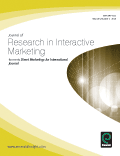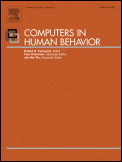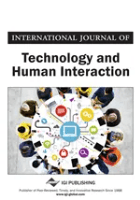
Internet Research
Scope & Guideline
Exploring the Digital Frontier of Human Interaction
Introduction
Aims and Scopes
- Digital Communication and Social Interaction:
This area examines how digital platforms facilitate communication, social interactions, and community building. Research often explores phenomena such as social media usage, online communities, and the impact of digital communication tools on interpersonal relationships. - E-commerce and Consumer Behavior:
The journal frequently publishes studies on online shopping behaviors, consumer engagement, and the effects of digital marketing strategies. This includes research on social commerce, user-generated content, and the role of influencers in shaping consumer attitudes. - Health and Well-being in Digital Contexts:
Research in this scope investigates the intersection of digital technology and health, focusing on topics such as telehealth, online health communities, and the effects of digital tools on mental and physical well-being. - Technology Acceptance and User Experience:
This area covers studies on the acceptance of new technologies, user experience design, and the psychological factors influencing technology use. It includes frameworks for understanding user interactions with AI, chatbots, and other emerging technologies. - Misinformation and Digital Ethics:
The journal addresses critical issues related to misinformation, digital ethics, and the implications of technology on society. This includes research on fake news, information overload, and the ethical considerations of digital practices. - Digital Transformation and Organizational Behavior:
Research here focuses on how organizations adapt to and leverage digital technologies for innovation, performance, and employee engagement. This includes studies on enterprise social media, digital leadership, and the impact of technology on workplace dynamics.
Trending and Emerging
- Influencer Marketing and Social Commerce:
The rise of social media influencers as pivotal figures in marketing strategies is a significant trend. Research is increasingly focused on how influencers affect consumer behavior, brand trust, and purchasing decisions, particularly in social commerce contexts. - Mental Health and Digital Well-being:
There is a growing interest in understanding the effects of digital technology on mental health, including issues such as social media-induced anxiety, cyberbullying, and the role of online communities in providing social support. - AI and Automation in User Experience:
Research on the integration of AI technologies in user interactions is trending, with a focus on how AI impacts consumer experiences, trust in digital services, and the ethical considerations surrounding AI deployment. - Misinformation and Its Management:
The prevalence of misinformation, especially in the context of public health and social issues, has sparked a surge in research exploring methods to combat false information, the psychological factors driving misinformation spread, and the effectiveness of various interventions. - Metaverse and Virtual Interactions:
The exploration of the metaverse as a new frontier for social interaction, commerce, and user engagement is emerging as a critical area of research. This trend encompasses studies on virtual reality, augmented reality, and their implications for user behavior and experiences.
Declining or Waning
- Traditional Marketing Practices in Digital Spaces:
There has been a noticeable decline in research focusing on traditional marketing techniques applied to digital platforms, such as basic SEO or email marketing strategies, as the field shifts towards more innovative and integrated approaches that leverage social media and influencer marketing. - Basic Internet Usage Patterns:
Studies that merely describe general internet usage patterns without deeper analysis of user behavior or implications have become less frequent. The focus has moved towards understanding the motivations, experiences, and psychological impacts of internet use. - General Cybersecurity Awareness:
While cybersecurity remains a critical issue, research specifically aimed at general awareness of cybersecurity threats and basic protective measures has diminished. There is a growing emphasis on specific contexts and advanced threats rather than broad awareness campaigns.
Similar Journals

Internet Pragmatics
Exploring the Intersection of Language and TechnologyInternet Pragmatics, published by John Benjamins Publishing Company, stands as an essential journal within the fields of Computer Networks and Communications and Linguistics and Language. With an ISSN of 2542-3851 and an E-ISSN of 2542-386X, it has been dedicated to exploring the nuanced interactions and societal implications enabled by the internet since its inception in 2019. The journal has quickly gained a strong academic reputation, achieving a Q3 ranking in its Computer Networks and Communications category and a prestigious Q1 ranking in Linguistics and Language for 2023, showcasing its vital contribution to interdisciplinary discourse. Researchers and professionals alike can benefit from its robust collection of articles that delve into the intersection of technology and communication, making it a pivotal resource for those keen on understanding the evolving landscape of digital interaction. Although currently available through traditional access options, the journal endeavors to broaden access, ensuring that valuable insights in this rapidly advancing field reach a wider audience.

Journal of Research in Interactive Marketing
Leading the Charge in Interactive Marketing ResearchJournal of Research in Interactive Marketing, published by Emerald Group Publishing Ltd, stands as a premier outlet for scholarly research within the dynamic field of marketing, specifically focusing on the intersection of technology and consumer behavior. With an impressive 2023 Scopus ranking placing it in the Q1 category of Marketing, and an elite percentile of 95th among its peers, this journal is dedicated to advancing the theoretical and practical understanding of interactive marketing. The journal covers a wide array of topics that include digital marketing trends, consumer engagement strategies, and the impact of social media on marketing effectiveness, consistently attracting high-quality submissions from researchers and professionals alike. Operating since 2010, it continues to reflect the evolving landscape of marketing practices and technology, making it a vital resource for scholars and industry leaders seeking to enhance their knowledge and strategies in this fast-paced sector. While not open access, the journal ensures that its content remains relevant and accessible to those at the forefront of marketing innovation and research.

INTERNATIONAL JOURNAL OF INFORMATION MANAGEMENT
Fostering insights that redefine the landscape of information management.International Journal of Information Management, published by Elsevier Science Ltd, is a premier journal dedicated to advancing the field of information management and its associated disciplines. With an impressive impact factor and categorized in the Q1 quartile across multiple domains such as Artificial Intelligence, Computer Networks and Communications, Information Systems, and Library and Information Sciences, this journal stands at the forefront of research excellence. Established in 1970 and running through to 2025, it serves as a vital platform for disseminating influential research and innovative ideas within these rapidly evolving fields. The journal's rigorous peer-review process ensures that only the highest quality research is published, thereby fostering academic discourse and collaboration among researchers, professionals, and students globally. Although it does not currently offer open access, the journal provides essential access options through institutional subscriptions, making groundbreaking research accessible to a broad audience. By continually adapting to the dynamic landscape of information management, the International Journal of Information Management reinforces its significance as a leading source of knowledge and insight for those dedicated to the advancement of science and practice in this vital sector.

Computers in Human Behavior Reports
Bridging technology and psychology for innovative solutions.Computers in Human Behavior Reports, published by ELSEVIER, is a distinguished open-access journal dedicated to advancing interdisciplinary research at the intersection of technology and human behavior. Since its inception in 2020, the journal has quickly gained a prominent position in the academic field, attaining Q1 category rankings in multiple areas including Applied Psychology, Artificial Intelligence, Cognitive Neuroscience, Human-Computer Interaction, and Neuroscience (miscellaneous). Its robust standing is evidenced by its exceptional Scopus ranks, particularly in Neuroscience—where it is positioned 4th out of 49 journals—demonstrating a high level of influence and engagement within the community. The journal's aim is to disseminate cutting-edge research findings and foster dialogue among researchers, professionals, and students alike, thereby addressing crucial questions regarding the impact of technology on human behavior and vice versa. As an open-access publication based in the United Kingdom, it not only enhances the visibility of research but also ensures wider accessibility to groundbreaking insights that shape our understanding of human-machine interactions.

Information Technology & Tourism
Bridging Technology and Travel ExperiencesInformation Technology & Tourism is a premier scholarly journal published by SPRINGER HEIDELBERG, focusing on the intersection of technology and tourism. With its ISSN 1098-3058 and E-ISSN 1943-4294, this esteemed journal boasts a remarkable impact factor and recognition as a Q1 journal in multiple categories, including Computer Science Applications, Information Systems, and Tourism, Leisure and Hospitality Management for the year 2023. The journal is notable for its rigorous peer-reviewed content, providing a platform for high-quality research and innovative practices that shape the future of the tourism industry through information technology. Researchers, practitioners, and students alike will find invaluable insights into emerging trends and technologies that drive efficiency and enhance customer experience within the tourism sector. With its converged time frame from 2014 to 2024, Information Technology & Tourism is poised to continue its influence, making it a crucial resource for anyone interested in the dynamic relationship between IT and tourism.

COMPUTERS IN HUMAN BEHAVIOR
Navigating the Evolving Landscape of Human-Computer InteractionCOMPUTERS IN HUMAN BEHAVIOR, published by Pergamon-Elsevier Science Ltd, stands as a premier journal in the interdisciplinary domain of human interactions with computing technologies. With a substantial impact factor and consistently ranking in the Q1 category across multiple fields—including Arts and Humanities, Human-Computer Interaction, and Psychology—this journal addresses crucial insights into how technology shapes human behavior and social interactions. Since its inception in 1985, it has evolved to encompass a breadth of studies that investigate emerging trends and challenges in digital environments, making it an essential resource for researchers, professionals, and students dedicated to advancing knowledge in this dynamic field. The journal, identified by its ISSN 0747-5632 and E-ISSN 1873-7692, is available for exploration through traditional access methods. With a focus on fostering scholarly discourse, COMPUTERS IN HUMAN BEHAVIOR continues to contribute significantly to the understanding of the increasingly complex relationships between humans and machines.

International Journal of Technology and Human Interaction
Transforming Perspectives on Technology's Role in Daily LifeInternational Journal of Technology and Human Interaction, published by IGI Global, serves as a critical platform for the exploration of the intersection between technology and human behavior, offering an interdisciplinary lens on topics within the realms of Human-Computer Interaction and Information Systems. With an ISSN of 1548-3908 and an E-ISSN of 1548-3916, this journal has been contributing to scholarly discourse since its inception in 2005, with ongoing publication until 2024. Hosting a diverse range of research articles, case studies, and reviews, the journal aims to advance the understanding of how technology influences human experience and interaction patterns in various contexts. Although currently positioned in the Q4 quartile of both Human-Computer Interaction and Information Systems categories, the journal fosters knowledge that aspires to redefine scope and standards within the field. Its commitment to quality research is reflected in its Scopus rankings, showcasing its relevance despite its emerging status in academia. Targeting researchers, professionals, and students alike, the International Journal of Technology and Human Interaction invites contributions that address the pressing challenges and innovations at the nexus of technology and human interaction.

Human Behavior and Emerging Technologies
Advancing Insights at the Intersection of Behavior and TechnologyHuman Behavior and Emerging Technologies is a pioneering open-access journal published by Wiley-Hindawi, dedicated to advancing the understanding of the intersection between human behavior and technological innovation. With an E-ISSN of 2578-1863, this journal has quickly established itself as a leading platform for disseminating research from 2019 to 2024 and proudly holds a prestigious Q1 ranking in Human-Computer Interaction, Social Psychology, and Social Sciences (miscellaneous) as of 2023. Its exceptional Scopus rankings place it in the top 1% of journals in the fields of general social sciences, social psychology, and human-computer interaction, underlining its significance in an increasingly technology-driven world. The journal aims to foster interdisciplinary collaboration and explore novel approaches to human behavior, offering insights that appeal to researchers, practitioners, and students alike. As an open-access publication, it enhances accessibility to fundamental research findings that inform policy-making, technological development, and social practices in an era characterized by rapid technological advancement.

Information Communication & Society
Connecting Research and Practice in the Information AgeInformation Communication & Society, published by Routledge Journals, Taylor & Francis Ltd, is a premier journal in the fields of communication and library and information sciences, boasting an impressive impact factor and consistently high rankings in Scopus, including Rank #18/511 in Communication and Rank #14/280 in Library and Information Sciences for 2023. With its focus on the dynamic interplay between information technology and society, the journal serves as a vital platform for researchers, professionals, and students, facilitating the discussion of contemporary issues that shape digital environments. Since its inception in 2001 and converging from 2005 to 2024, the journal has maintained a rigorous peer-review process to ensure that it publishes high-quality research that contributes to ongoing debates and developments in the digital age. Although it does not offer open access, the journal's esteemed reputation and Q1 categorization underscore its impact within the academic community, making it an essential resource for anyone interested in the evolution of communication in the modern world.

Journal of Theoretical and Applied Electronic Commerce Research
Bridging theory and practice in e-commerce research.Journal of Theoretical and Applied Electronic Commerce Research is a prestigious peer-reviewed journal published by MDPI, dedicated to advancing the field of electronic commerce through theoretical exploration and practical applications. Since its establishment in 2006, this Open Access journal has provided a critical platform for researchers, professionals, and students interested in the dynamic intersection of commerce, technology, and business management. Based in Switzerland, the journal evokes a robust scholarly environment, reflected in its impressive rankings: Q1 in Business, Management and Accounting and Q2 in Computer Science Applications as of 2023. With an enduring commitment to disseminating significant findings, the journal enriches the global academic landscape, encouraging innovative solutions to contemporary e-commerce challenges. The convergence period spans from 2006 to 2024, ensuring the inclusion of a wide spectrum of research topics that are relevant to both academia and industry stakeholders.